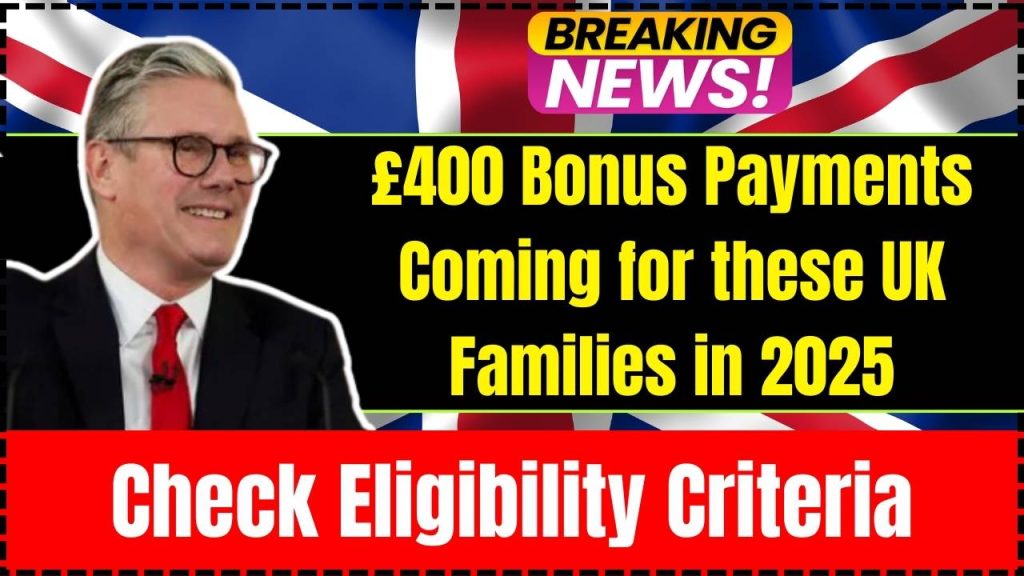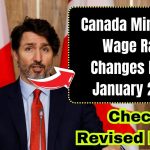
£400 Bonus Payments Coming for these UK Families in 2025: In 2025, many UK families are set to receive a £400 bonus payment aimed at alleviating financial pressures amid rising living costs. This one-time payment is part of the government’s extended Household Support Fund (HSF) initiative, designed to help low-income families, pensioners, and other vulnerable groups meet essential costs. Understanding the eligibility criteria, payment timelines, and how to apply is key to ensuring you don’t miss out on this crucial support. Below, we’ve broken down everything you need to know.
£400 Bonus Payments Coming for these UK Families in 2025
The £400 bonus payment in 2025 is a lifeline for many UK families navigating financial difficulties. By understanding the eligibility criteria, application process, and payment timelines, you can ensure you receive this crucial support. Combined with other schemes, it provides much-needed relief during challenging times.
| Detail | Information |
|---|---|
| Payment Amount | £400 per eligible household |
| Eligibility Criteria | Low-income families, recipients of certain benefits, and those meeting specific local council criteria |
| Application Process | Varies by local council; some may require applications, while others distribute automatically |
| Payment Date | Expected between April and June 2025; exact dates depend on local council schedules |
| Official Resource | UK Government’s Household Support Fund |
What Is the £400 Bonus Payment?
The £400 bonus payment is an initiative to support struggling households, especially those hit hardest by the rising cost of living. It falls under the broader Household Support Fund, a scheme aimed at providing financial relief for essential costs like food, utilities, and clothing.
Since the HSF is managed at the local level, councils have the flexibility to determine how the funds are distributed. This tailored approach ensures that the support reaches those who need it most.
Who Is Eligible?
Eligibility for the £400 payment may vary slightly by council, but the most common criteria include:
- Income Level:
- Households on low income or receiving income-related benefits like Universal Credit, Income Support, or Pension Credit.
- Specific Benefits:
- Recipients of benefits such as Disability Living Allowance (DLA), Personal Independence Payment (PIP), or Carer’s Allowance.
- Vulnerable Groups:
- Families with young children, pensioners, or those with disabilities are often given priority.
Tip: Always check your local council’s website for their exact criteria, as it can differ based on local needs.
How to Apply for the £400 Bonus Payments Coming for these UK Families in 2025?
The process for claiming the £400 payment varies by region. Here’s how you can navigate it:
- Automatic Payments:
- Some councils automatically identify eligible households and deposit payments directly into their bank accounts.
- Application Required:
- Other councils require residents to apply. In such cases, you may need to provide:
- Proof of income
- Benefit statements
- Photo identification
- Other councils require residents to apply. In such cases, you may need to provide:
- Check Local Guidelines:
- Visit your council’s website or contact their offices to confirm whether you need to apply.
Pro Tip: Start preparing your documents early to ensure a smooth application process if required.
When Will You Receive the Payment?
The payments are expected to roll out between April and June 2025, though exact timelines depend on individual councils. Keep an eye out for official announcements from your local council for precise dates.
Impact of the £400 Bonus
For many families, the £400 bonus payment could mean relief from financial stress. For example:
- Energy Bills: Help with soaring electricity and gas costs.
- Groceries: Cover essentials for households on tight budgets.
- Childcare Costs: Provide some breathing room for families with young children.
Past HSF initiatives have been life-changing for recipients. For instance, a 2023 recipient in Manchester used the grant to buy winter clothes for her children and pay off part of her overdue energy bill, reducing her anxiety during a challenging season.
How Does It Compare to Other Schemes?
The £400 bonus payment complements other ongoing support measures, including:
- Energy Price Guarantee: Helps cap energy costs for households.
- Child Benefit Payments: Weekly payments for children, recently increased to £25.60 for the eldest child.
- Discretionary Support Schemes: Local councils offer one-off grants for emergencies.
While the £400 payment is substantial, combining it with these schemes can create a more comprehensive safety net.
Expert Opinions
Financial expert Sarah Allen emphasizes the importance of such schemes: “For many families, an extra £400 can prevent them from falling into debt during difficult times. However, timely action—like checking eligibility and applying early—is crucial to maximize the benefit.”
Social worker John Mason adds, “These payments don’t just provide financial relief; they also bring peace of mind to households, allowing them to focus on other aspects of life.”
DWP £1200 Bonus for Universal Credit: Eligibility, Payment Dates, and How to Claim!
Up to £12,000 DWP’s Back Payment Plan Compensation Payment – Who will get it? Check Date
DWP Offers £812 Budgeting Loans – Get it without any Interest, Check Details
Frequently Asked Questions (FAQs)
Q1: Can I receive the £400 payment if I’m already receiving Universal Credit?
Yes, individuals on income-related benefits, including Universal Credit, are among the primary recipients.
Q2: What happens if I miss the application deadline?
Check with your local council. Some councils may have discretionary funds available for late applicants.
Q3: Will the £400 payment affect my other benefits?
No, this payment is not expected to impact any existing benefits.
Q4: How can I verify if my payment was processed?
Your local council will usually send a confirmation via post or email. Alternatively, contact them directly.
What Should You Do Next?
- Visit Your Council’s Website: Find the specific eligibility criteria and application process for your area.
- Gather Required Documents: If an application is needed, prepare proof of income and benefit documentation.
- Stay Updated: Regularly check for announcements to ensure you don’t miss deadlines.






